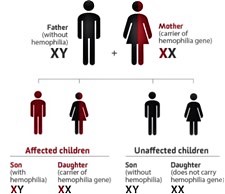A recent article in the New England Journal of Medicine describes the success of phase 1–2 trial of hemophilia B gene therapy. The study evaluates the adeno-associated virus (AAV)-based gene therapy candidate for the treatment of patients with severe and moderately severe hemophilia B, with less than 2% factor IX compared to normal values.
Hemophilia B is a rare X-linked bleeding disorder caused by mutations of the blood clotting factor IX. The patients are mostly males. Treatment at present involves weekly injections of recombinant clotting factor IX. This regular ‘replacement therapy’ maintains threshold levels factor IX (above 1%) to decrease the bleed rate. However, compliance is variable, and treatment is expensive so not available to all patients. This approach does not prevent debilitating arthritis and joint damage due to chronic inflammation of the synovial lining when blood accumulates in a joint and corrodes the articular cartilage.
With successful gene therapy, a single infusion could radically reduce bleeding risks and all complications of hemophilia B. No weekly injections would be needed, and the patients would lead a normal life.
How was this hemophilia B gene therapy studied?
The researchers utilized FLT180a, a liver-directed adeno-associated virus (AAV) gene therapy that uses a synthetic capsid and a gain-of-function protein to normalize factor IX levels in patients with hemophilia B. The clinical trial was led by experts at the University College London (UCL), the Royal Free Hospital, and Freeline Therapeutics, a clinical-stage biotechnology company.
In this multicenter, open-label, phase 1–2 trial, the researchers assessed the safety and efficacy of varying doses of FLT180a in patients with severe or moderately severe hemophilia B (factor IX level, ≤2% of normal value). All the patients received glucocorticoids with or without tacrolimus, an immunosuppressive drug, to decrease the risk of vector-related immune responses. Different doses of FLT180a were tested. The primary end points were safety and efficacy, as assessed by factor IX levels at week 26. After 26 weeks, patients were enrolled in a long-term follow-up study.
Sustained factor IX levels in the normal range were observed with low doses of FLT180a but necessitated immunosuppression with glucocorticoids with or without tacrolimus. The long-term follow-up study will monitor the patients for durability of expression and surveillance for late effects.
Reference: Chowdary P et al. Phase 1–2 Trial of AAVS3 Gene Therapy in Patients with Hemophilia B. N Engl J Med 2022; 387:237-247. DOI: 10.1056/NEJMoa2119913
See also:

One patient of the ten participants was a failure.